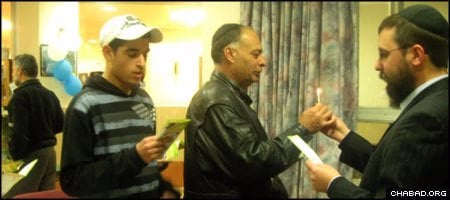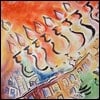The footage captured by the Israeli cameraman is haunting: With the piercing screech of an air raid siren in the background, the Ashkelon man peers out his window for a view of the school next to his apartment building. The undulating wail ends, and out of the silence comes the sound of a rocket whizzing past before an explosion shakes the room, setting off car alarms below.
It was a near miss.
Others have not been so lucky in the wake of the largest Israeli air strike against the Palestinian-controlled Gaza Strip since 1967’s Six Day War. Throughout Saturday night and Sunday, as waves of aircraft pounded military targets in Gaza and Hamas forces retaliated with rocket attacks aimed at Israeli civilians, Chabad-Lubavitch emissaries and rabbinical students made the rounds of hospitals to visit with the wounded.
They also offered encouragement to soldiers who, with ground forces massed around the border for a possible invasion of Gaza, faced the prospect of full-scale war for the first time since the 2006 conflict with Hizbullah forces in Lebanon.
Smack dab in the middle of Shabbat, Kassam rockets fired by Palestinians struck throughout the western Negev region, causing the first Israeli casualty of what the Israel Defense Force has dubbed Operation Cast Lead: Netivot resident Avraham Vaknin was killed by shrapnel from an exploding rocket as he was making his way to the bomb shelter in his building.
“This was the first time a missile hit someone here,” said a stunned Rabbi Yashar Edrei, director of Chabad-Lubavitch of Netivot. “Everyone is anxious.”
Longer-range Grad rockets struck farther into Israel’s interior, raining down on the coastal city of Ashkelon and causing explosions in Kiryat Gat and Gan Yavne. On Sunday, the Mediterranean port of Ashdod – just 30 kilometers from the urban center of Tel Aviv – was hit for the first time.
All told, almost 100 rockets have been fired from the Gaza Strip since the beginning of the Israeli offensive.
“My children are scared,” said Edrei. “But what can we do? We’re here, and we’re not running away.”

Living in the Crosshairs
Four of Saturday’s injured were transported to Soroka Hospital in the desert city of Be’er Sheva, where they were visited by Rabbis Zalman Gorelik of the city’s Chabad Center and Menachem Kutner, director of Chabad’s Terror Victims Project.
One man, who was on his way to synagogue when a rocket exploded nearby, underwent several surgeries and was in the Intensive Care Unit throughout Sunday. Gorelik and Kutner gathered the man’s extended family in the waiting room to light a Chanukah menorah and pray for a speedy recovery.
Throughout Israel, teams under the auspices of the Chabad-Lubavitch Youth Organization delivered boxes of powdered doughnuts – a traditional Chanukah food – to soldiers, taking the opportunity to talk about the Chanukah message of the victory of light over darkness.
Emissaries living closer to the Gaza Strip, however, found themselves living in closed military zones, under orders to stay within a certain distance of a bomb shelter at all times.
In Kiryat Malachi, residents were startled by Red Alert sirens on Shabbat, but by Sunday morning, the atmosphere “was calm,” said Chana Hertzel, who runs the local Chabad-Lubavitch Youth Club with her husband, Rabbi Elimelech Hertzel.
“Everything is fine,” said Elimelech Hertzel. “Every Jew has somewhere to go.”
But in Ashdod, with the siren blaring in the background, Devorah Faiga Goodman explained that all of her neighbors had decided to camp out in their shelters. She struck a fearless note, pointing out that in the 27 years she’s co-directed the local Chabad House, she’s been no stranger to terror. Six years ago, she survived an attack when a terrorist opened fire at a bar mitzvah, wounding one.
“We were here during the Gulf War,” when Iraqi-fired Scud missiles struck targets throughout Israel, she said. “We’re not scared. We have work to do.”
Hours later, two rockets landed just east of the city.
In Gan Yavne, residents had some warning of impending danger in the sound of aircraft taking off from the nearby Hatzor Air Base. Many locals were called up to reserve duty, some in the middle of Shabbat services. (The IDF indicated that a call-up of close to 7,000 troops could happen at any time.)
On Sunday morning, one rocket struck just outside the city. But Rabbi Schneur Kurant, director of the local Chabad House, decided to hand out doughnuts to the soldiers at the air base.
On the Lookout
Through it all, many citizens have signaled their intention to not let the fighting impact their day-to-day lives. In Ashkelon, where sirens have been going off around the clock, new immigrant Adam Schreiber went shopping for a bicycle and items for his new apartment.
“I’m not scared,” said Schreiber, originally from Los Angeles, who was medically discharged from the U.S. Army in May after being injured in a mortar attack in Afghanistan. “For the kids, though, it must be horrifying.”
“They’re just as afraid as the rest of us,” said Rabbi Menachem Lieberman, director of Chabad of Ashkelon, after organizing a Chanukah party for pediatric patients at Barzilai Hospital who had been moved to underground shelters for their protection.
In Sderot, a desert city less than three kilometers from Gaza that through the years has been the worst hit among targeted locales, residents spent the last days of Chanukah waiting for miracles.
“Thank G‑d, everything is very quiet,” Rabbi Moshe Zev Pizem, director of the local Chabad House, said Sunday afternoon. “There appears to be a lull, but people really don’t know what is going on.
“Chanukah is a time of miracles,” he added, “so we’re hoping for and expecting more miracles from G‑d.”








Join the Discussion